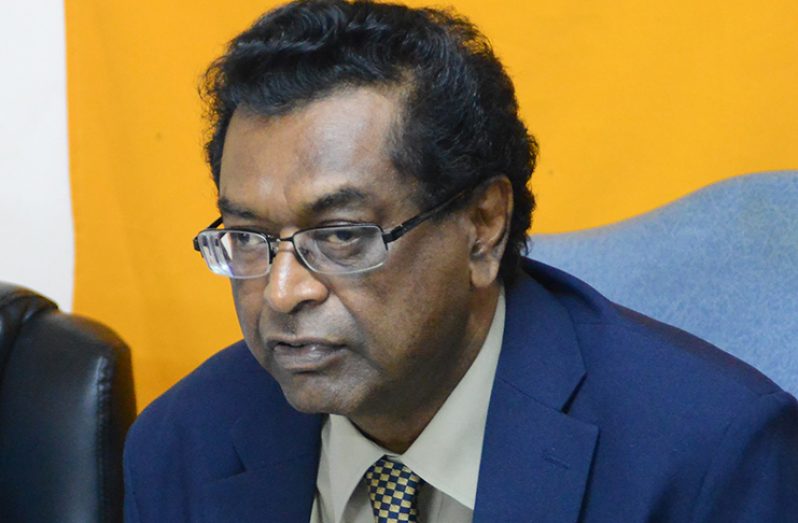Ramjattan laments low convictions in high-profile cases
MINISTER of Public Security Khemraj Ramjattan says he is mulling ways in which there can be more successful prosecutions in high-profile criminal cases of crime against the state and even hinted at a shake-up of the prosecutorial services that fall under his ministry.
Described as “very embarrassing” and “stressful” knowing that a number of high- profile cases in which convictions were expected but have not gone in the prosecution’s favour, Ramjattan said he is mulling “a shake-up of the prosecutorial services by asking them to be more responsible…”
He was at the time responding to an observation by political activist, Mark Benschop, during his appearance on the live Radio 107.1 FM, programme, in which he cited certain convictions that were expected of Phantom Squad operatives, a major drug lord who was recently deported from the United States of America (USA) to Guyana and living a free life; none of the “big fishes” that were taken to court by the Special Organised Crime Unit (SOCU) being convicted or sent to prison.
Admitting that there were indeed very bad examples, the public security minister remarked “We have to do better than that”, while noting that … it is a journey that will not be done overnight, but they are trying to do the best that can be done.
Among some of the bad examples are prosecutors not turning up in court resulting in the magistrates throwing out cases and people who are obviously guilty being freed. For some of those persons who got off, he said that probable convictions had awaited them.
He noted too, cases where witnesses who had already given statements (to the police) not wanting to go into the witness box because they know the defendants, and in instances where they do they claim they could not remember what had occurred or claim that what is written as the statement was not what they had said and become hostile.
In relation to the alleged fraud cases involving senior officials of the previous government, Ramjattan said, “it will take some time,” as had happened in a number of Third World countries where you start an anti-corruption campaign, witnesses give statements then “change their mouth, either because of pressure or certain individual circumstances.”
He conceded that it has been “very embarrassing.” They have not been capable of breaking the barriers in terms of gaining convictions. However, by virtue of what is contained in the files by way of the investigations and forensic audits, as it relates to theft of government property, he said there was now a strategic move which was a step up of “beyond the reasonable doubt and criminal proceedings and rights the accused have” that they have been finding to be incapable of breaking. It is for such reasons that the strategic State Assets Recovery Act (SARA) has been crafted whereby the agency, through a civil procedure, can go after stolen property, Ramjattan added.
While the government has made efforts to bring to justice the culprits behind the massacres of innocent Guyanese during the “Troubles,” the methodical killing of those with evidence continues to hinder conviction. The period in Guyana from August 11, 1999 to December 3, 2011 has been dubbed the “Troubles” by President David Granger, who recently said that he was disappointed that, even now, persons were being executed for the knowledge they hold.
This, in turn, continues to hinder the work of law enforcement in bringing peace to the many who lost relatives during the period characterised by drug-driven chaos and bloodshed under the Bharrat Jagdeo administration.
“This is a major factor that there might be people out there who are unwilling to speak because it might be felt that persons who disclose evidence which could incriminate the actual culprits might themselves be eliminated,” the President said. From August 11, 1999 to December 3, 2011 there were three massacres: Lusignan where 11 people were killed- Bartica where another 12 were killed and Lindo Creek where seven miners were slaughtered. Besides these, there were countless extra-judicial killings- with some activists estimating that around 400 Afro-Guyanese males were gunned down.
The President has stated that it was only through the acquisition of evidence that persons involved can be charged. “A previous commissioner of police, at some time not too long ago, in relation to another massacre, had mentioned that all of the witnesses were killed. I found it very difficult to believe that there had been methodical elimination of all witnesses for some of those 12 massacres that occurred in the ‘troubles’,” he said.
“We did make a start having a Commission of Inquiry into the Lindo Creek Massacre and even now the relatives of the persons who were killed would like to see some follow-up and we are discussing with them the recommendations of the Lindo Creek Massacre. But, it pointed to the fact that there has not been any smoking gun; that evidence has not been sufficient to bring anybody to justice and that many of the possible witnesses have been killed or eliminated.”




.jpg)









